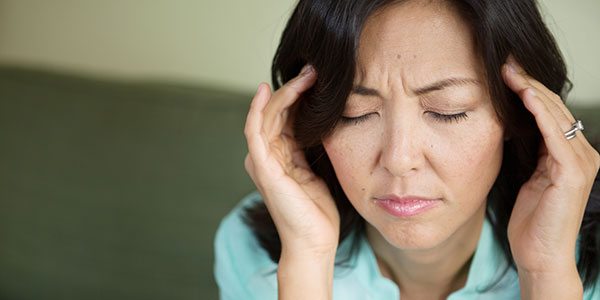Fluctuating levels of hormones, especially sex hormones, can contribute to headaches in both men facing andropause and women undergoing menopause.
Perimenopause and Menopause
The unstable levels of female hormones that occur during menopause can actually bring relief to women who used to suffer from headaches. In other women, their headaches worsen.
A woman who is approaching menopause, a time called perimenopause, is undergoing a decline in her estrogen levels. The decline is rarely abrupt or even particularly orderly. This is why women in perimenopause may have a normal period one month, skip a couple of months, experience spotting, then have another period followed by months of amenorrhea. When a woman has not had a menstrual period for a year, she is considered to be in menopause.
Aside from producing less estrogen, the woman also produces less progesterone and even less of the hormone testosterone, which is the hormone associated with men. Men make testosterone in their testicles and adrenal glands, while women make it in their adrenal glands and ovaries. Women have about one-third of the amount of testosterone that men do.
The varying levels of sex hormones can affect the frequency and severity of a headache. Some women are prescribed HRT, or hormone replacement therapy, by their doctors to deal with other troublesome symptoms of menopause. How HRT affects the woman’s headache is uncertain. As with perimenopause and menopause, some women find relief while others find that their pain is more frequent and severe.
Hormonal Change-Induced Side Effects, Not Just For Women
With andropause, the levels of testosterone and estrogen in a man also fluctuate until the levels of testosterone are suppressed, and the levels of estrogen are raised.
The symptoms of andropause in men can be about as dramatic as they are in women, though not every otherwise-healthy man experiences andropause the way every healthy woman experiences menopause. Andropause doesn’t mean that the man can no longer father children, unlike menopause, which means that the woman can no longer bear children. Also, what one thing to consider is a low-testosterone level differs from one man to the next.
Besides reduced energy, libido and strength, a man who is experiencing andropause can be subject to a fairly dramatic weight gain as the testosterone is converted to estrogen in his body. Estrogen helps men and women accumulate fat, so a man can experience weight gain and bloating in his belly as well as “man-breasts.” He may experience irritability that alternates with depression, fatigue, sweating and headaches. As with women, some men are given hormone therapy. In this case, they are treated with synthetic testosterone.
The good news is that there are ways for people in perimenopause, andropause or menopause to control their headaches. There may be foods that work in tandem with their hormone levels to trigger their pain. These foods may include red wine, hard cheeses, chocolate, dairy products or caffeine. A regular exercise program also seems to stop a headache from occurring. Doctors recommend that patients exercise about 30 minutes, three or four times a week. Sometimes this is no more complicated than going for a walk outside. Other therapies include acupuncture, an ancient Chinese therapy that accesses the body’s energy through the use of hair-thin needles, herbal supplements or vitamins and therapies such as biofeedback.





